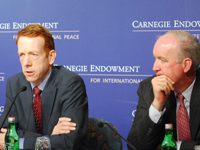Registration
You will receive an email confirming your registration.
Although the Obama administration has sought to elevate the importance of diplomacy and development as U.S. foreign policy tools, there remains uncertainty over the role of democracy promotion. Most discussions of democracy promotion policies have centered on the value of high-level diplomatic reactions to issues such as fraudulent elections or human rights abuses. Questions surrounding the efficacy of U.S. democracy assistance, which quietly proceeds in more than 100 countries around the world, are too often ignored.
Focusing on USAID, the largest U.S. funder of democracy assistance, Thomas Carothers discusses how to improve this vital aspect of U.S. foreign policy in his report, Revitalizing U.S. Democracy Assistance: The Challenge of USAID. James Boomgard, President, Development Alternatives International, Lorne Craner, President, International Republican Institute, and Dorothy Taft, Director of the USAID Office of Democracy and Governance, commented on his findings and David Abramowitz , Chief Counsel to the House Foreign Affairs Committee moderated the discussion.
USAID: A Troubled Institution
According to Carothers, despite its many achievements in democracy and governance assistance, USAID is beset by serious institutional deficiencies that hinder its work in this domain. Some of the key problems include:
- Stifling bureaucratization that chokes off innovation and flexibility.
- An over-reliance on external agencies for program design and implementation, a practice that precludes local ownership of programs and reduces the technical capacities of USAID itself.
- Inadequate integration of democracy and governance priorities and capacities within USAID's institutional structures.
Necessary Reforms
Although the task is daunting, reforming USAID’s democracy and governance capabilities is an important and worthwhile endeavor. Carothers noted that some of the most crucial reforms include:
- De-bureaucratizing USAID by conducting a sweeping review of every step of the assistance process and devising ways to streamline procedures, ease restrictions, simplify reporting requirements, improve evaluations, and rationalize the procurement process.
- Increasing local ownership of programs by increasing direct assistance to organizations in recipient countries and by changing how USAID works with implementing partners to encourage genuine partnerships that build sustainable local capacity.
Carothers, Boomgard, and Taft all noted that democracy and governance work at USAID is woefully understaffed and recommended increases in funding to strengthen the cadre of democracy and governance officers and bolster the Office of Democracy and Governance. Boomgard also emphasized the need to incorporate democracy and governance work into all aspects of U.S. foreign assistance and to improve USAID’s democracy assistance evaluation capacity.
Need for Leadership
According to Carothers, successful reform will require determined and focused leadership at USAID, the State Department, the White House, and Congress, leadership that is willing address the vital, but unglamorous, operational methods and structures of democracy and governance assistance.
While noting that the Bush administration did not always match its impressive rhetorical edifice on democracy with adequate attention to the democracy assistance domain, Craner argued that the Obama administration’s rhetoric and action on democracy have been inconsistent and weak at times.
The Time is Now
For the first time in many years, both the Congress and the White House have a strong interest in reforming USAID.
- The House and the Senate are currently rewriting the underlying legal basis of U.S. foreign assistance.
- In July, the State Department announced the institution of a Quadrennial Diplomacy and Development Review and in August, President Obama signed a Presidential Directive for a first-even comprehensive review of U.S. development policy.
- Taft argued that USAID recognizes its own institutional challenges and is willing and ready to implement needed reforms.
In many of his foreign policy speeches, President Obama has spoken on the need for a better, more holistic understanding of democracy. Revitalizing USAID’s democracy and governance work would be a strong signal that President Obama is serious about reinvigorating U.S. democracy aid policy and will help the United States meet the significant challenges confronting many democracies worldwide.
